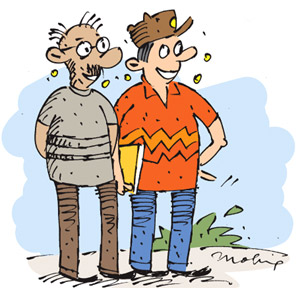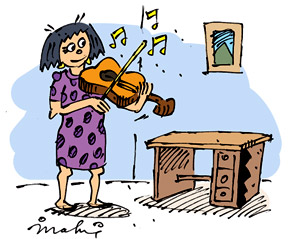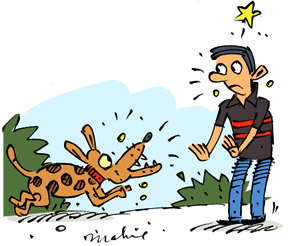|

by R. S. Karunaratne
Adjectival phrases and clauses
An adjectival phrase describes the qualities, features or states
attributed to a noun or pronoun.
You have a nice room.
Amanda is a happy girl.
|

Sanath is as tall as his father.
|
A phrase with an adjective functioning as the head is an adjective
phrase. An adjective phrase can have an attributive function when it is
used before a noun.
The dress has a smooth texture.
When it is used after a verb, it has a predicative function.
The film Titanic was very interesting.
A discontinuous adjective phrase refers to an adjective phrase which
is split into two parts, with one part known as ‘pre-head’ and the other
part known as ‘post-head’.
Sanath is as tall as his father.
Here ‘as’ is the pre-head and ‘as his father’ is the post-head.
An adjective phrase can begin with a preposition. It can describe a
noun and it usually comes immediately after the noun it describes.
The boys around the swimming pool were ready for the event.
Do you know that girl with curly hair?
Be careful of the stranger next to you.
The dog under the table is barking.
Many houses by the sea were damaged by the tsunami.
An adjective clause or a relative clause has a finite verb. However,
an adjective phrase does not have a finite verb.
Nelum took the violin which was on the table and started playing it.
Jacob owns the hotel that is behind our house.
My grandmother is the woman who donated the land to the school.
Don’t you feel sorry for the animals which are in cages?
A girl who has blue eyes sat next to me.
We had lunch at a hotel which is beside the river.
We use ‘who’ only with people.
|

Nelum took the violin which was on the
table and started playing it. |
The king who built the stupa ruled the whole country.
People who criticise others soon become unpopular.
Students who passed the examination were jubilant.
Those who do their studies diligently pass examinations easily.
Women who are beautiful take part in beauty pageants.
We use ‘which or ‘that’ for animals and things.
The cows which were grazing are returning to the farm.
Monkeys which are white are hard to find.
Dogs and cats which are domestic animals receive our attention.
The furniture that was hired cost a fortune.
The elephants that walked in the procession were tall and majestic.
[Activity ]
Fill in the blanks with ‘who, which’ or ‘that’. Check your answers
with the key.
1. The students .............. had not brought their notebooks had to
stand.
2. The dogs ................... bark seldom bite.
3. The fishermen ............... were fishing in the sea went missing.
4. Do you know the woman ............... gave you this letter?
5. People ............. are proud can be seen almost everywhere.
6. The stamps ................ had been pasted on the letters were
missing.
7. The books .................... you bought for me are very expensive.
8. Some animals ............... live in the jungle are ferocious.
9. The teachers .............. accompanied the students got into the
train.
10. Those ............... help others are doing a service.
Key :
1. who 2. which / that 3. who 4. who 5. who 6. which / that 7. which
/ that 8. which / that 9. who 10. who

Here is a quiz to expand your vocabulary. Read the words in bold type
in each sentence and try to find their meanings. Check your answers with
the key.
1. The approximate cost of the printing machine is Rs. 10 million.
(a) rough
(b) exact
(c) lowest
2. After his leg was amputated, the soldier had to use an artificial
leg.
(a) comfortable
(b) man-made
(c) natural
3. Rain and drought affect every aspect of our lives.
(a) age
(b) stage
(c) part
4. Thousands of spectators assembled at the Sugathadasa Stadium to
watch the international cricket match.
(a) gathered
(b) dispersed
(c) watched
5. The government has been assessing the impact of recession.
(a) neglecting
> (b) evaluating
(c) postponing
6. His leadership qualities are the greatest asset of the governing
party.
(a) problem
(b) disadvantage
(c) advantage
Key:
1. (a) 2. (b) 3 (c) 4. (a) 5. (b) 6. (c)
Starters:
Present for the future
We use ‘am, is’, and ‘are’ + an ‘....ing’ verb for something
happening now. In grammar we call this present continuous or progressive
tense.
I am reading a newspaper.
Sita is sewing a dress.
Hemantha is flying a kite.
|

The dog is barking at a
stranger. |
The dog is barking at a stranger.
We also use ‘am, is’, and ‘are’ + ‘.....ing’ verb for the future.
I am playing cricket tomorrow .Jayantha is going to India on Monday .
Are you meeting the director this afternoon ?
What are you doing at the weekend ?
I am not going out tonight .
When we say, “We are doing something tomorrow”, we mean that we have
arranged to do it. In other words we have a plan to do something.
Chandana is organising the show on Sunday .
Lionel is covering the meeting tomorrow .
Jane and Barbara are leaving for Jaffna tomorrow .
We do not use the simple present tense for arrangements.
I am going for swimming this evening. (NOT I go for swimming this
evening)
Prem isn’t coming to my birthday party tonight. (NOT Prem does not
come to my party tonight.)
We are meeting the minister tomorrow. (NOT We meet the minister
tomorrow.)
She is meeting her friends on Sunday. (NOT She meets her friends on
Sunday.)
However, we use the simple present tense for timetables and
programmes.
The Kandy train leaves at 8 a.m.
hat time does the train leave for Kandy?
he concert starts at 6.30 p.m.
When we decide to do something we use the ‘going to’ form and the
verb.
I am going to buy a car.
Father is going to sell his motorcycle.
Are you going to apply for the post?
[Activity ]
Complete the following sentences using ‘going to’ + the verbs given
in brackets. Check your answers with the key.
1. My hands are
dirty...................................................... (wash)
2. I ............................................. (travel) by train
tomorrow.
3. Yasa .......................................... (follow) an
engineering course.
4. Take this umbrella ........................................... (rain)
5. I am hungry. .............................................. (eat)
this bun.
6. We .......................................... (buy) her a birthday
present. |

